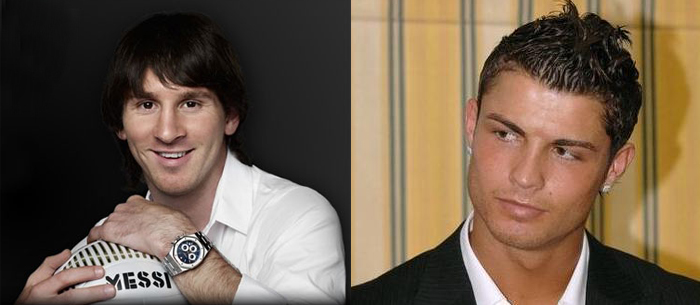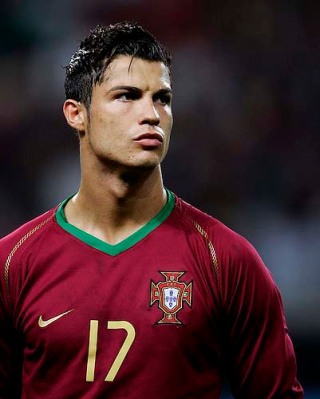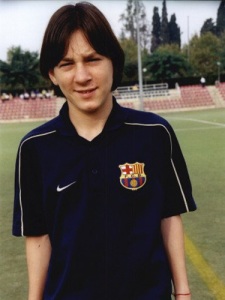 Left: Lionel Messi (Argentina, Barcelona FC) and Cristiano Ronaldo (Portugal, Real Madrid)
Left: Lionel Messi (Argentina, Barcelona FC) and Cristiano Ronaldo (Portugal, Real Madrid)
When God is bored he repeats himself. Generates cyclical crises in the economy, identical natural disasters, literary characters called William Wilson in Edgar Allan Poe’s stories. And creates suspiciously similar and symmetrical duets from time to time. As worldly amusements.
I think about this every time Lionel Messi and Cristiano Ronaldo appear on the same playing field, either before or after the kickoff, the background of hundreds of decibels generated by a match between their teams, and between them, the tension almost tangible, you can almost touch it, in a game where they match in egos, status and talent.
I look at them and think: the story of a Mozart and Salieri, capriciously transmuted to two men who make music with their feet. Not in an art, but in a sport.
What could be the unspeakable martyrdom of an elite player like Cristiano Ronaldo? Not to possess, today, the Golden Ball or the FIFA World Player? No. Let’s look further. To be player number two, shadowed by another name, the one who is spoken of as a complement, not as essence? So close, but no.
The personal drama of Cristiano Ronaldo, an industrial Portugueseso media prominent, a factory to make millions and attract flashes, is to be the acolyte of a little, too-flamboyant star and at the same time, too vulgar. To say today thatthe ArgentineanLionel Messi, at23-years-old, with his good-natured image is the best football player in the world, may sound facile. In factit is.
But if we look at recent history, only in 2008, when the Portuguese Christiano seemed untouchable, and in an egocentric fit worthy of anthologysaid to theBrazilian newspaperO Estado de Sao Paulo, without his voice trembling,that he was “the first, second and third in the world,” everything takes a new twist.
The next year and the year following, he would no longer be.
I think of Cristiano like that Antonio Salieri portrayed in Milos Forman’s fabulous film, who secretly sniffed Mozart’s scores, enjoying withsearing passion that inaccessible matter, too high, inhumanly sublime for histalentof a worthy, but mortal, artist.

Right: Mozart (Tom Hulce) and Salieri (F. Murray Abraham) in the film “Amadeus”
Salieri himself did not understand how God had made such a terrible mistake of giving such an extraordinary gift, the unfathomable genius of the eternal, to a ridiculous character like Wolfgang Amadeus Mozart: uneducated, boorish, lacking the solemnity of creation.
Christiano’s face, put on a scale with Messi’s, could not inspire a more exact, more visceral envy, than that of the courtier Salieri.
Why Lionel Messi? Why is the player who is spoken of in irritating terms (not just the best in the world, but, horrors! the one pointed to by many players, authoritative voices, as the best of all time), why is he, it’s precisely that, well, such a little thing?
How is this so? Because inverting the sense of certain of Ronaldo’s own words: so short, so little. I piece of a man. A boy at odds with all glamor: no facial beauty, no physical beauty, no class. With the voice of a happy little laborer, who cuts short every sentence, and who must be pushed by the interviewers if they want to hear him say more than platitudes and little kitsch phrases.
 Left: CR7: The moniker given to the sophisticated Portuguese striker of Real Madrid
Left: CR7: The moniker given to the sophisticated Portuguese striker of Real Madrid
Lacking charisma, not seeming to understand that he’s the third highest-earning athlete on the planet, who seems not to know that two hundred and seventy children’s clubs in Latin America have his name, and who is still showing he wants to be the scrawny kid who just wants kick the ball around the neighborhood. And nothing more.
If we add the ability to convert great goals, his ability to make destabilizing moves, we have a crack that moves the sports world at his feet.
But this fierce Lusitanian didn’t take something into account, known to be talented, enjoying it, looking down and savoring it. The best man in 2008 didn’t take into account, when it was said he was the first, second and third best in his sport: the silent presence, almost insignificant, of an undeniable genius, the kind that only occurs once every hundred years. As one Argentinean writer would say: because they tear the womb of Nature.
 Right: Messi “the Flea”: Golden Ball in 2009 and 2010 and the FIFA World Player in 2009 and 2010
Right: Messi “the Flea”: Golden Ball in 2009 and 2010 and the FIFA World Player in 2009 and 2010
And it is not always that he breaks his own his records. The magic of him name comes, above all, from his way of playing. It is unique, an unrepeatable secret. The sense he gives the ball on the ground, the juggling, the impossible tricks, the joy with which he starts every play, whether it is frustrated or ends up in the goal.
Leo Messi plays like no one, scores like no one. According to Eduardo Galeano, writer and soccer maniac, he is the best of all because he still plays like a little kid in the neighborhood. And revels in it. Just does it. And if he misses, he suffers in silence: he doesn’t cry for the cameras, he doesn’t look for cover. At the same time, nor does he externalize happiness far beyond normal. Even with some of those goals for which some football idols and have coined a particular term: Playstation goals.
Because there is an immaterial particle, an atom higher and elusive, that separates the great men of real genius. There is something in a certain class of men — Miguel Angel, John Lennon, Pablo Picasso, Capablanca — that distances them from those whom we admire, but who are rarely remembered through the centuries.
And that’s the tormented difference for a man of exceptional virtues like Cristiano, but distant — perhaps just by a step, a single damn step! — from the category of genius: he knows that this little drab-haired man will be remembered by world football fans, when he himself we be spoken of only in statistics.
Cristiano knows he is a man for the years, but not the ages. He knows that stripe is Roberto Baggio, Ruud van Nistelrooy, Fernando Redondo, David Beckham: unforgettable players. But that never, how hard he tries no matter how much he wants it, no matter how violent his fibrous body and scoring goals like a machine, as much as he is the “scorer” of the League, he could join other display names , residents of another shrine: Maradona, Pele, Di Stefano. He will not be a Goodwill Ambassador for UNICEF. Time Magazine will not consider him one of the 100 most influential people in the world.
What will it feel like, the number one, two, three Cristiano, when listening to legends such as Karl-Heinz Rummenige, Enzo Francescoli, Romario, and Maradona himself, saying quietly that Messi-the-flea is not just better today, but in the history of the sport, there has not been another like him?
What will he feel when they say that other cracks today, like Arjen Robben, Thierry Henry, Wayne Rooney and Ronaldinho Gaucho, I say it again?
How to digest that the man who left the post of deputy, who has taken the last two gold balls, measuring seven inches less than him, unless it is the vigilance of advertisers who do not know how to sell his image deteriorated, and to top it off: he has cost 95 million euros less than him?
That is the acid data, that exclusivity adds ironies in the history of the elect: while the most celebrated club in the sport, Real Madrid, paid 95 million euros to Manchester United’s Portuguese striker, it is estimated that the FC Barcelona invested in Lionel Messi, since he became a child player at age 11, only 330,000 euros.

- Lionel Messi, snapped up by FC Barcelona at age 11
God is also often beautifully wicked, and builds legends worth speaking of: The parents of little Lionel should move from Argentina to the Catalan city, if they wanted to save his talent and even his life. At eleven years old he was diagnosed with a serious illness affecting his growth, so that he should be in Europe. It was the only way that the boy could grow normally.
For the minimum sum of $900 a month, the Barcelona Club paid for Lionel’s hormonal treatment: daily injections in both legs for three years. In this way, he entered for life the only professional club he has belonged to, the ties of gratitude to which bind him beyond what football, and from which it has managed to destroy all the hallmarks of previous legends.
While today’s clubs would be willing to shell out terrifying sums on this player, the team paid for Messi only through his treatment. Not a penny more.
The motto of the Cristiano is a futuristic spectacle: CR7. Like everything about him. His initials, and number. The motto of Messi, is also worthy of him: the flea. Just that. The magazine player versus the ugly duckling. The virtuous selfishness against modesty exacerbated. A refined Antonio Salieri that will not forgive his God for placing the sacred genius in Mozart’s trashy soul.
Cristiano knows that he desired by the fans, by the technicians. He knows he is feared by goalkeepers. But within him, a bitter taste, an imperceptible twinge pulses, pulses, pulses: he knows he is number two. And against that, there is no remedy. Especially when journalists make hay from his unbridled grief: when he is asked, mercilessly, by the raptors of the news: To you, is Leo Messithe best in the world? And he should say yes. Although he swallows the phrase. And even chews his assent, almost biting, with an indifferent expression in his eyes.
The two: one a machine player, the other player a rustic genius, Cristiano Salieri, Amadeus Messi, unknowingly staged an exciting and sinister plot, a script of impeccable suspense, in the mosaic of characters, secret poetry and vital energy, which is to play the ball. In what better way to define football, as there is none other than the mercies of God.
Translated by: Angelica Morales
May 11 2011
